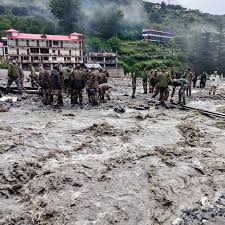Sleeping disasters: On the Uttarakhand disaster, the Himalayas.
Governments must monitor silt accumulation at vulnerable points.
The disaster in Uttarkashi district of Uttarakhand serves as a reminder of the permanent risk of destabilisation in the Himalayas. At least four persons were killed and at least 60 people are feared washed away after a mass of water, debris and muck triggered by torrential rain hit the Kheer Ganga river on Tuesday afternoon. The flood hit hotels and residential buildings in Dharali town, situated 8,600 feet above sea level, where video footage recorded by residents showed giant waves of water gushing through the area, engulfing people and homes. Several Indian Army personnel are also feared dead, according to preliminary reports.
The proximate cause of the disaster is the extremely heavy rainfall from August 3 to 5, with some parts of the district reporting nearly 30 cm of rainfall over a single day due to the monsoon and its active phase over North India. The fury and the volume of the water that gushed through the town seemed to suggest that this was a sudden event, prompting State officials to categorise it as a ‘cloudburst’. However, this has a very specific meaning in how the India Meteorological Department (IMD), the official forecaster, defines it. A large volume of rain, of at least 10 centimetres in an hour over 10 square kilometres, is what usually qualifies as a cloudburst. The lack of weather radars at those altitudes means that the IMD is incapable of such a computation. Therefore, it could very well be that continuous heavy rain over the past 48 hours may have loosened the soil and combined with the craggy, undulating terrain, unleashed large volumes of silt along with copious amounts of water. Whether it was a sudden event or the result of a gradual build-up might seem only of academic interest, given the loss of life, livelihood and property. The knee-jerk categorisation as a ‘cloudburst’ allows state authorities to claim helplessness. Once it is projected as a freak phenomenon, the event only elicits social media commiseration from public authorities in the form of ‘prayers’ and ‘deep sadness’ and a pre-defined token sum as disbursement. The recent past shows that these are anything but outliers. Climate change has increased the probability of extreme rainfall events and, therefore, the numerous infrastructure projects undertaken in the hills and the resulting debris act as latent explosives that are triggered from such rainfall. Following relief operations, the State government must — as soon as conditions are conducive — review debris and silt accumulation at critical points in the State to buffer the inevitable damage from climate change.
